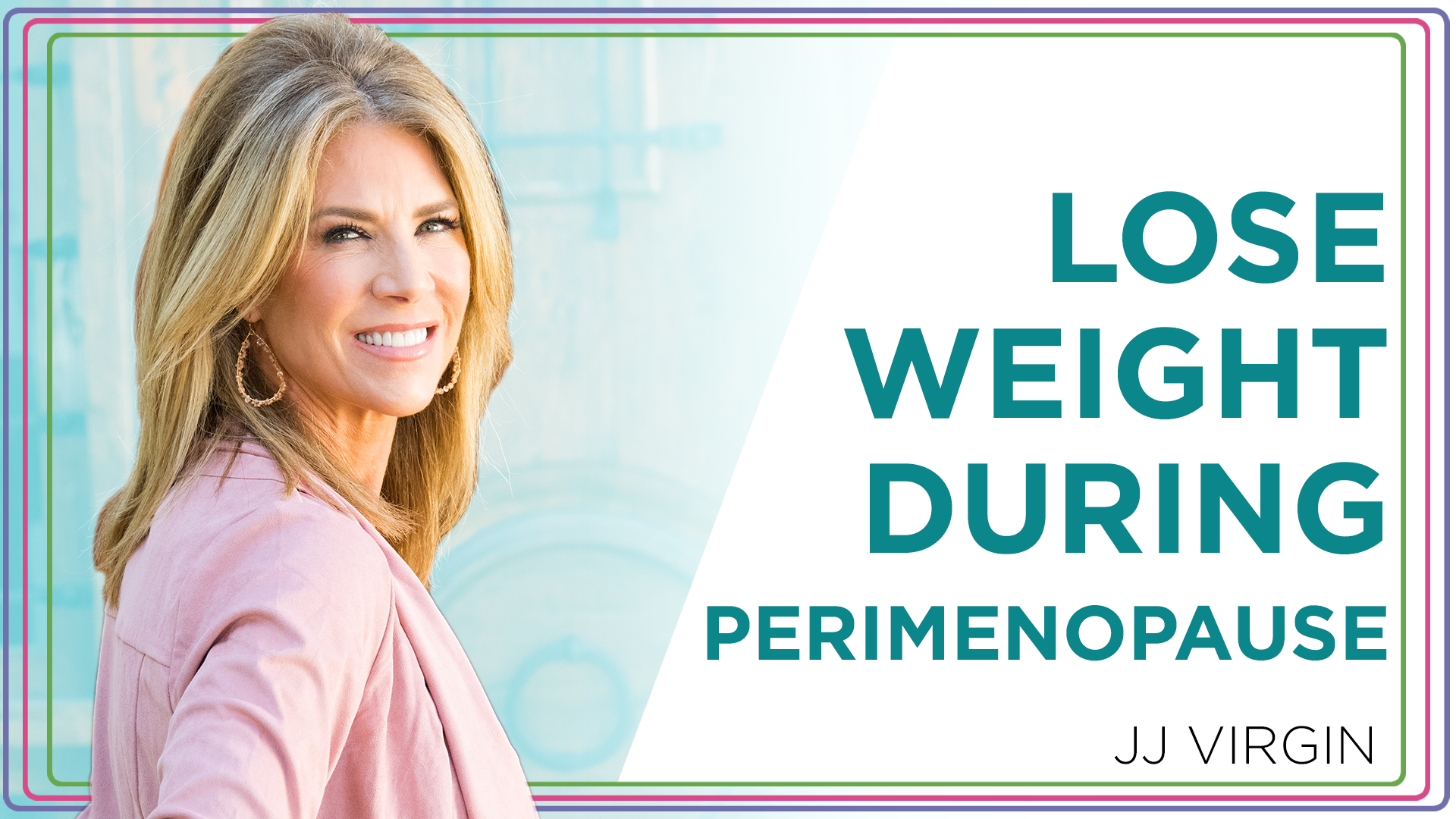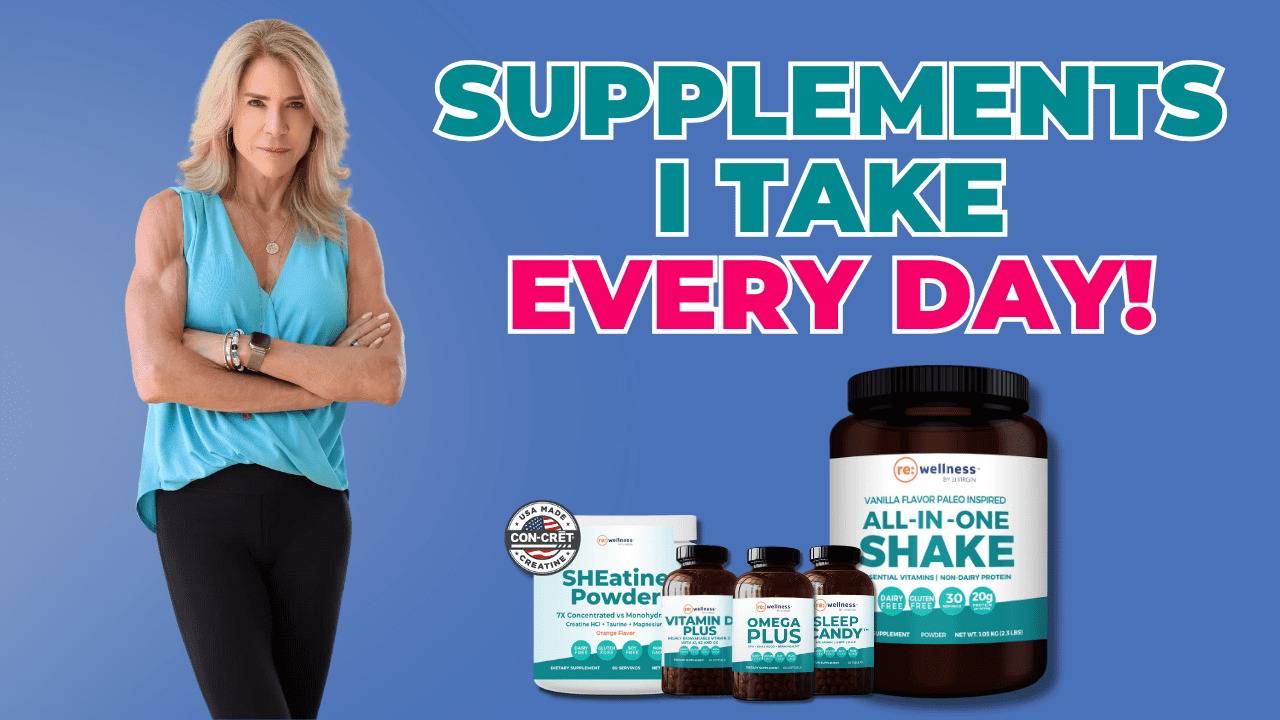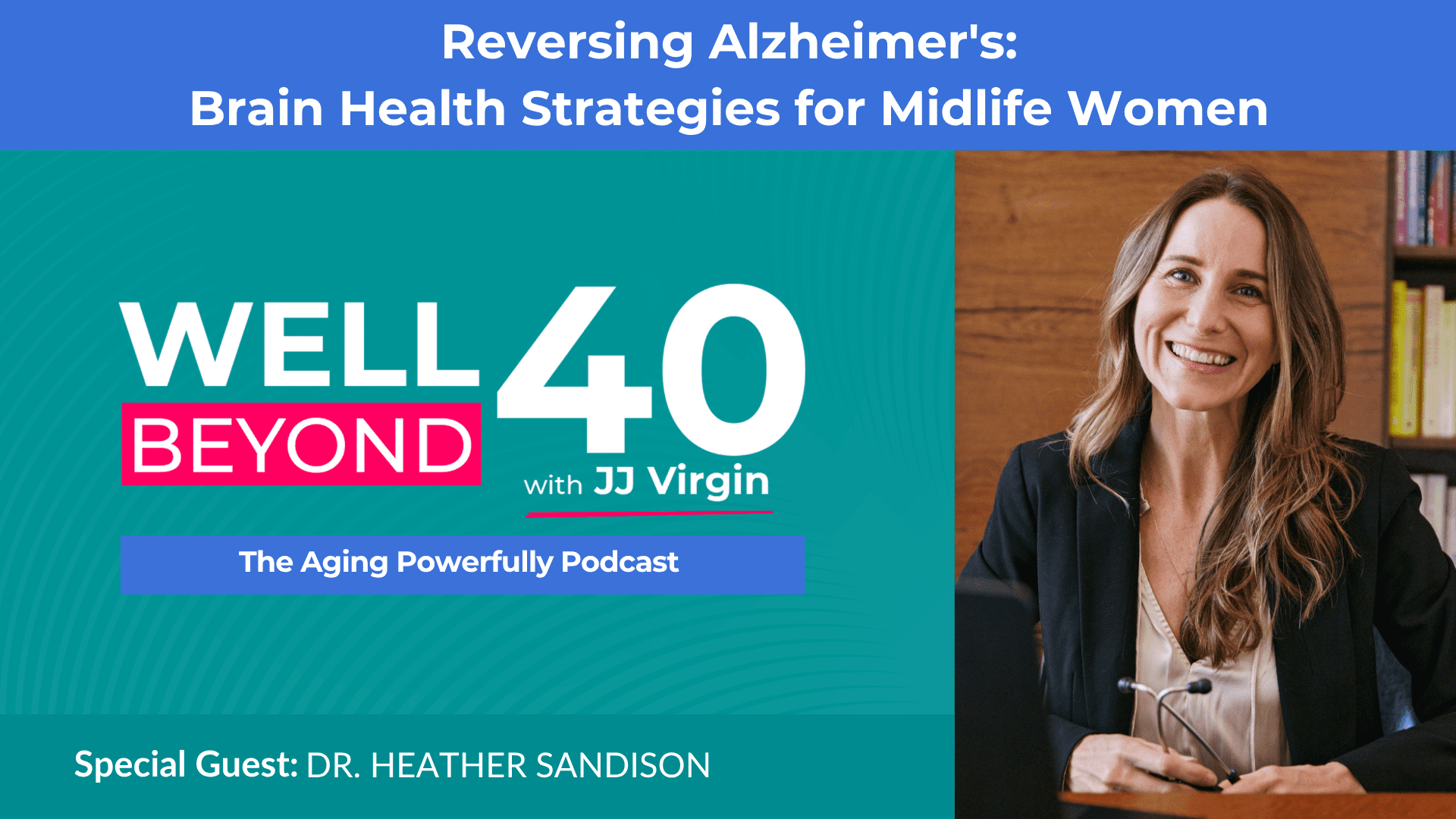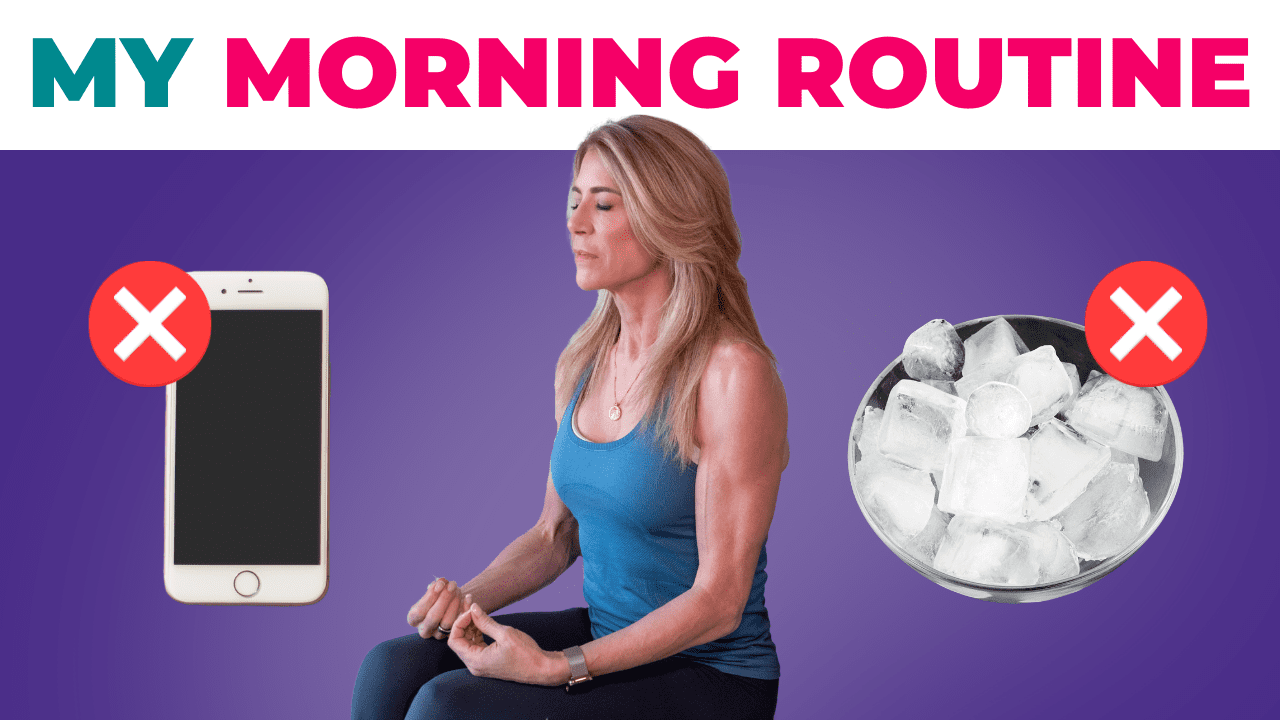7 Ways to Be Proactive & Prepared for Menopause
Perimenopause provides an opportunity to prepare for the upcoming changes of full-blown menopause. In this episode, JJ provides 7 ways to get a jumpstart on those big changes so you transition through menopause looking and feeling better than ever. You’ll learn why stress management is critical for hormone balance, how to optimize sleep, the overlooked secret for weight loss (if you don’t do this, it’s harder for your body to use fat as fuel), why thyroid health impacts nearly everything (and what tests to ask for), and the right foods to support healthy estrogen metabolism and avoid weight gain. Perimenopause can be a great time to make healthy changes, and the effective strategies JJ shares here will support your journey into menopause and beyond.
Mentioned in this episode:
Watch the FULL VIDEO on JJ’s Youtube Channel
Listen up to learn how to manage stress levels
Learn more about the benefits of meditation
Read 5 reasons to eat dark chocolate every day
Get great sleep with Sleep Candy™
Learn more about why building muscle can help you lose weight
Learn more about thyroid testing and other lab tests you can order at home
Fit in more fiber with Extra FIber
Learn more ways to master menopause
Order B vitamins, probiotics, magnesium, and other supplements at JJ’s store
Click here for more information and offers from our sponsors
ATHE_Transcript_Ep 458_YT 30
JJ Virgin: [00:00:00] Hey, this is JJ Virgin. Thanks so much for joining me. This is ask the health expert. In each episode, I put the power of health in your hands and share ways to get healthy, lose weight, heal your gut detox and lots more. So you can look and feel better fast if you’d rather watch the video. Hey, I did put on my makeup and do my hair.
So check it out on my YouTube channel.
Today, we’re talking perimenopause, which is pretty much your body’s warning shot. That menopause is coming and you will definitely wanna be prepared. And since we’re usually focused on menopause, like it’s some line in the sand, we cross perimenopause, doesn’t always get the attention it deserves, but this whole phase, before you go into full blown menopause, [00:01:00] Is the beginning of some really big changes in your body.
So you have to be prepared and know how to take care of yourself during this transition. So you can feel great and yes, even still lose weight with so much flux happening. I hope these seven tips will help on this channel. I share a lot of information tools and tips about ways to feel great and lose weight.
So please like, and subscribe to make sure you don’t miss any of it. So let’s talk perimenopause. First, here are a few things you’ll wanna know if you don’t already, for some women perimenopause can start as early as in their thirties, but for most women, the obvious signs start when they’re between 40 and 44.
And it may last between four to eight years because it doesn’t officially end until one year after your final menstrual period, which is the international sign for welcome to menopause. And then you. Technically post-menopausal. So of course we know menopause is called the change. And when you say that, I think someone plays the [00:02:00] jaws music, you know, so calling it the change pretty much sets up our expectations that things will happen when we hit menopause.
but the changes in weight and metabolism and overall health that a lot of women experience after menopause, well, actually starts years earlier. And if you can tune in, you can get a jump on them and make sure they don’t hit you like a ton of bricks. So how do you even know you’re in perimenopause? Well, it’s sorta like puberty in reverse.
It’s this long slow process of hormonal changes. You, you probably won’t notice for the first few years during that time, your body is making more and more of a hormone called follicular stimulating hormone. And when that hormone FSH crosses a certain threshold, your ovulation suddenly gets less regular.
And that’s usually when, you know, because the first obvious symptoms are changes in menstrual flow and changes to the length of your cycle. Your cycle could be shorter [00:03:00] or it could be longer. And you may notice your period’s getting a little heavier or lighter than usual, or you might get some hot flashes or get a little drier.
You may even find yourself on an estrogen roller coaster. And that creates its own fun symptoms like moodiness and fatigue. Okay. I know this sounds a little bit like a nightmare, but hang in there. We’re gonna address all of this in a second. So this F S S F S H creeps up higher and higher until the whole journey ends with menopause.
And again, menopause is that last bleed and then 12 months after that, your postmenopausal. All right. So how do you stay as balanced as possible during this time? How do you keep your metabolism humming and feel good in your skin? let’s start first with managing stress. Now you’re gonna wanna make handling your stress, your top priority.
If you wanna feel good and lose weight during perimenopause. Plus stress doesn’t stop there. I mean, it takes a toll on everything. [00:04:00] The reason it’s so important to jump on it and perimenopause is because your stress is mostly managed by cortisol and DHEA, which are two hormones produced by your adrenal glands. And your adrenal glands are gonna take on an even bigger burden when you get into menopause with additional androgen and estrogen production.
So if you don’t have the strategies to, to support them, The adrenal fatigue is gonna be a killer. When you get into menopause. Now, chronic stress puts you into this survival mode where your body thinks either you’re about to become part of the food chain or you’re gonna starve. So it cranks up the stress hormones to get your attention.
Cortisol is the main one here. And when your cortisol is constantly elevated, you can’t sleep. You’re irritable, you’re hangry and you’re craving carbs. And guess what? This results. Weight loss resistance. You can’t seem to shake the weight, especially around your belly, no matter how good your diet is. So there’s a direct [00:05:00] connection between stress and weight gain.
And of course it ages you faster too. So I’m gonna give you a few of my stress busting strategies for weight loss. Now the first one is to eat by the plate. You see stress messes with your blood sugar and when you eat protein, fat and fiber, my trifecta. You counteract that because you keep your blood sugar really balanced.
Next. I want you to start drinking green tea. If you don’t already green tea contains an amino acid called altheine and that naturally reduces blood pressure and anxiety. And of course you wanna exercise, but there are a few specific kinds of exercise that really help with stress. One of them is hit training, high intensity interval training because it trains your nervous system to handle stress better.
The other one is yoga and yoga is like a tonic for your nervous system, help balance it out. And then just walking after a meal. And one of the [00:06:00] reasons I love walking after a meal is you’ve got both the stress reduction, but it also helps lower your blood sugar response to a meal. And then meditation meditation can be a game changer as far as a tool for handling stress and anxiety and candy.
What see. I just instantly lowered your stress levels. You’re going, did I hear her right? Yes. Candy. All right. Not just any candy, dark chocolate, the flavinols in dark chocolate boost brain function and lower stress hormones. And then you can also use lavender around the house or in your pillow or in your bath before bed lavender reduces blood pressure and heart.
and if you want more, I did a full video on stress busting strategy. So you can check that out as well. All right. So after stress, the next one up for feeling great losing weight during perimenopause sleep. And this may be a time when you are not sleeping. You know, when you’re in perimenopause, everyone thinks it’s all about estrogen [00:07:00] and yes, estrogen can be a wild ride, but you’ve been dealing with that since your first period.
Right? So we know about that and we know what we can handle there. What you may not know is that a lot of your symptoms are actually being. By low progesterone, get irregular periods, the increase in your stress, hormones, the feeling of anxiety and irritability, and you wanna crawl outta your skin and then not sleeping well.
So there are a couple of things that you can do. First, you may wanna take a little biodentical progesterone. It’s great to use at night to help with sleep. And it also helps with stress. The way it works is that it’s usually cycled in 14 days after the start of your period. So if you wanna try that, I recommend you work with a functional medicine doctor who can talk to you about it and help you get started now for extra help, sleeping better.
You can also use my sleep. Candy seems to be a theme here because it has melatonin in it, which you need to stabilize and reinforce that circadian rhythm in your body. So 99, [00:08:00] next number three. You’re gonna wanna add muscle. Now, this is super important. It’s gonna have a huge impact on the way you feel and how easy it is for you to lose weight.
So do not wait on. And tell menopause and post menopause, because it’s gonna be harder then. You wanna do it now and get your body really used to using fat as fuel. So perimenopause is a use it or lose it time for muscle. If you do nothing, which I hope is not gonna happen on my watch, you are gonna be able start to lose muscle mass and.
And yes, you may find that you have to work a little harder than you used to because in perimenopause, you’re gonna need to eat more protein and lift heavier weights in order to build that muscle. Okay. So you’re gonna have to work a little harder for it, but it’ll be worth it because then you can build that muscle and that’s gonna prevent bad stuff down the road.
There’s so much adding muscle can do for you, [00:09:00] especially in terms of body fat. Now weight gain isn’t inevitable, but left unchecked, that will grow around your belly and more muscle will help you burn fat without even trying how’s that sound? So adding muscles also helps support your bones and helps slow bone loss, which means you have a lower risk of fractures and osteoporosis.
Now, believe it or not, those risks can be high for. Perimenopausal women and muscle also helps balance your hormones, especially your stress hormones, and it can help fight insulin resistance. In fact, one of the first places you can start to restore insulin sensitivity is in the muscles. So it’s gonna help you handle blood sugar better.
So it’s kind of a no brainer, right? Do some strength training, lift weights, use your body weight, use a TRX and do it a couple times a week. I wanna do as many things that are full body movements here. Things like squats and lunges and pushups and pullups, and [00:10:00] you can get an assist again with something called a TRX trainer.
Check it out. It’s the easiest way to set up a home gym for like a hundred bucks. So you can do this, but any kind of resistance, again, your own body weight. Weights is gonna help you build muscle. And when you build muscle, your body is better burning fat. Win-win all right. Number four, you gotta make sure your thyroid is functioning and functioning really well.
Now I’m mostly talking about an underactive thyroid here, but of course it could also be overactive that has its own set of problems. But for now I’m focusing on sluggish, cuz if your thyroid is sluggish, The symptoms can be really tough. And the list of symptoms is long. Ready, weight, gain, fatigue, your cold, your skin’s dry, your hair’s dry.
Your hair’s falling out. Your cholesterol levels are going up. Your sex drive is going down. You feel puffy and bloated. You can’t build muscle. You’re little depressed. You’ve got some brain fog. You [00:11:00] might be losing the outer 3rd of your eyebrows. Your skin tinge might be a little Tingy, yellow you’re constipated.
Watch for those signs. It’s actually how I caught my thyroid issues really quick, like within a week or two. So look at those first and do not fall for the, the numbers that are the normal range. You wanna be ideal. Another clue is that if your weight bounces up and down a couple pounds a day, that’s not normal by the.
that could either be signs of a food intolerance or a metabolism gone wild, right? Cause your thyroid, remember it regulates your metabolism, including your energy levels and how well you burn fat. If your body doesn’t make enough thyroid hormone, you’re considered hypothyroid. And if you’re hypothyroid, that means you’ve got a lower metabolic rate.
So obviously a slow thyroid makes it hard, read impossible, nearly to lose. but this just is, it’s not really about, I [00:12:00] mean, it is about your weight, but it’s not just about your weight. It’s really about your health because mild hypothyroidism makes you tired, achy, less likely to exercise. So you pack on the pounds and when you’re tired, you’re probably craving and eating sugary foods and carbs.
So then you gain more weight for that reason too, but you could be hypothyroid and not even know it. If you’re undiagnosed that could have a serious impact on your heart health and your bone. And that’s super scary. So you wanna work with functional medicine doctor. Who’s gonna look past that normal range of the single TSH marker.
Now TSH is the thyroid stimulating hormone, which is produced by the pituitary gland. You wanna look at not just your TSH. You wanna look at your free T3, your T4, your verse T3 and your antibodies to get the full picture of how well your thyroid is functioning. And what you’re gonna find is that in a lot of places, the practitioners only look at TSH, [00:13:00] which could be in the normal reference range.
Right. But you can still be hypothyroid. So just testing TSH is not gonna give you the picture that you really need. All right. Another quick thing, you should also take a look at your iron levels and your cortisol levels as these are often outta whack as well, and an imbalance in cortisol. Impact the conversion of T4 to the active thyroid hormone T3.
So when you focus on healing, your thyroid, you’re gonna wanna look at your stress hormones. All right. So how do you support your thyroid? Well, mainly with the right diet and supplements, you’re gonna wanna start with the Virgin diet. It’s just globally great for balancing your hormones, reducing inflammation, bringing down those antibodies and increase your energy.
Sound good. And it’s gonna help you increase your fiber and fiber is good for producing the berate in your gut. That helps regulate thyroid hormones. The Virgin diet also removes the key high food intolerance foods. [00:14:00] That could be triggering an autoimmune response. Those are especially gluten, soy and dairy and corn.
And remember most of these thyroid issues are autoimmune. You’re also gonna wanna make sure that you’re getting enough of iodine, selenium, and zinc either from your food or supplements. And you need to know if you have the autoimmune type of hypothyroidism called Hashimotos. Right, because if you do, you’re probably gonna need to supplement with thyroid hormone.
Again, work with a functional medicine doctor. All right. Number five, phytoestrogen rich foods. You’re gonna want to eat these to support and detoxify your estrogen levels. Now drops in estrogen can cause a release of higher amounts of other hormones. So your thermostat goes haywire and the clue there is hot flashes.
so what do you do? Well, step one is you’re gonna want to eat more phyto, estrogen, rich foods. So [00:15:00] not all though. I want you to eat phytoestrogen rich foods, except for soy soy, no joint soy. That’s what I like to say, because it introduces a whole set of other problems due to its high lectin. And phytate Lloyds loads.
It’s Goitrogens, which can impact your thyroid. And if it’s not organic, holy smokes, the GMOs and the pesticide load. And by the way, It’s almost never organic and many forms are highly processed into junk food. Like soy hot dogs. Hello, soy ice cream, soy ghees, and all of that can then go in with those Goitrogens and mess with your thyroid function.
so no joy in soy, but we do wanna get into those other estrogens and phyto estrogens. And there’s great ones that can support your estrogen levels. They’re mainly from plant foods like chickpeas and flax seed and Sesame seeds and lentils and rice and carrots and garlic. And then some of the fruits, berries, peaches, and apples, and cruciferous vegetables like cauliflower and broccoli, Brussels [00:16:00] sprouts, and cabbage.
These are all rich in phytoestrogens. Number six. You’re gonna add I3C rich foods. What is that? All right. I3C stands for ready, indel three, Al and it is a powerhouse antioxidant and is found in those, those veggies I already talked about that are great with the phytoestrogens broccoli, brussel sprouts, cabbage cauliflower, and here’s why it’s important.
It makes sure. That estrogen goes where it can do good and does not go where it can reek havoc like promote cancer. So this is another reason to eat that broccoli, right? There’s always more reason. So you wanna make sure that you’re getting it, but you may not be able to get it enough in food. So you might need to be supplementing, which brings me to number seven.
And that is. So dim is one of my most favorite supplements for any woman [00:17:00] 40 plus it is a better absorbed metabolite of I3C it’s also found in of course, broccoli, cabbage, kale, water, Cress, right. All of these vegetables, but it’s hard to get enough of. So it’s something that you’re gonna wanna supplement.
All right, to wrap it and tie a bow on it. I’m also gonna throw out a few other things that you can do to help you feel great and lose weight during perimenopause. And that would include B vitamins, probiotics, and magnesium. And also you’re gonna wanna support your liver. So you may wanna think, okay, don’t shoot the messenger.
I may wanna think about cutting back just a little on alcohol, keep to the dry farm wines and caffeine. All right. Okay. I said cut back right now. If you’re a fast caffeine metabolizer, fortunately like me, then, you know, you’re probably fine to carry on. Okay. So I hope you can see that perimenopause can be a great time, a motivating time to make some lifestyle changes.
[00:18:00] So that things don’t get away from you and make it really hard to reverse later on down the road now is the time to take action. And if you enjoyed this and learned a few things, please hit the like and subscribe and join me next time for how to feel great and lose weight after menopause. See you soon
for more info on this and other health topics I cover or to rate and review, find me on Instagram, Facebook and my website, JJvirgin.com. And don’t forget to subscribe to my show. So you won’t miss a single episode. Go to subscribetojj.com. Thanks again for being with me this week.

 Subscribe to our show
Subscribe to our show 




